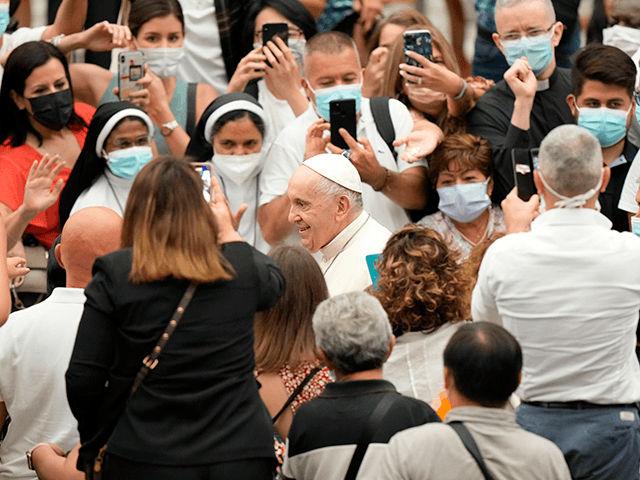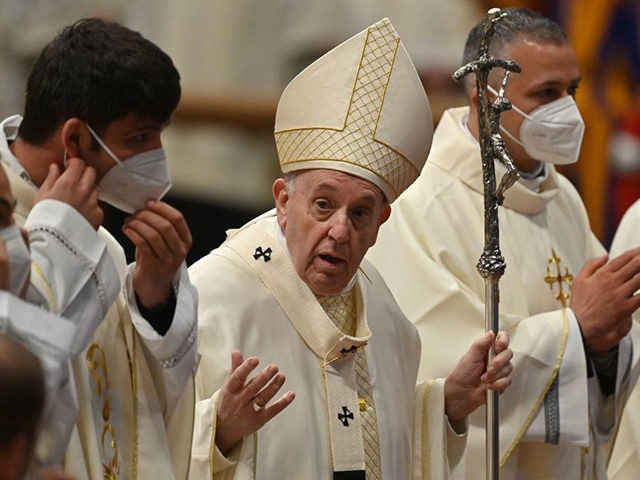ROME — Pope Francis said Monday the nearly exclusive attention on the coronavirus over the past couple years has meant a woeful neglect of many other lethal diseases.
Health and illness “are determined not only by the processes of nature but also by social life,” the pope told members of the Pontifical Academy for Life gathered in the Vatican.
“It is not enough for a problem to be serious for it to attract attention and be addressed appropriately,” the pontiff continued. “Many very serious problems are ignored due to a lack of adequate commitment.”
“Let us think of the devastating impact of certain diseases such as malaria and tuberculosis,” he said, noting that “the precariousness of sanitary conditions causes millions of avoidable deaths in the world every year.”
The Vatican City State announced Monday that effective October 1 no one can enter its territory without presenting a coronavirus Green Pass, by order of Pope Francis. https://t.co/4DiLIRDZxO
— Breitbart News (@BreitbartNews) September 20, 2021
“If we compare this reality with the worry that the COVID-19 pandemic has caused, we see how the perception of the seriousness of the problem and the corresponding mobilization of energy and resources is very different,” he observed.
The pope was quick to insist he was not criticizing the measures taken to stem the spread of the coronavirus but merely drawing attention to other serious health threats that have not received corresponding attention.
Moreover, the experience of widespread personal fear for our health “should make us attentive to what it means to be vulnerable and to live in precariousness on a daily basis,” he added.
“In this way, we will also be able to make ourselves responsible for those serious situations in which others live and in which we have had little or no interest up to now,” he said.
There are populations living on other continents “where other needs are more urgent,” he noted, “where not only vaccines are lacking, but drinking water and daily bread.”
“I don’t know whether to laugh or cry, sometimes cry, when we hear rulers or community leaders advising slum dwellers to sanitize themselves several times a day with soap and water,” he said, adding wryly that in the slums “there is no water and they do not know soap.”
The pope offered a similar critique of lockdown measures, which suppose a certain standard of living.

Pope Francis, center, is greeted by faithful during his weekly general audience, held in the Paul VI hall, at the Vatican, Wednesday, Sept. 1, 2021. (AP Photo/Andrew Medichini)
People say, “no, don’t leave the house!” he observed, but in the slums “the house is the whole neighborhood.”
The pope’s worries for unequal treatment of diseases has been echoed in numerous studies showing how regular treatment of even fatal diseases suffered major cutbacks due to a nearly exclusive focus on the coronavirus.
A 2020 report out of India, for instance, revealed that 42 percent of tuberculosis patients stopped receiving treatment due to reallocation of resources to deal with the pandemic.
“According to a report released in June, the COVID-19 had consumed 15,000 lives in the first three months of its outbreak,” the article stated. “But in the same period, 20,000 people lost their lives to the TB.”
“Experts believe that with resources being diverting to treat COVID-19 patients, the surveillance, contact tracing, and testing for tuberculosis has nearly ceased, leading to an alternate public health crisis,” it added.
For its part, the World Heart Federation warned in October 2020 that the coronavirus could “worsen outcome for those with ‘forgotten’ or neglected diseases.”
Pope Francis called Saturday for universal access to coronavirus vaccines and “the temporary suspension of intellectual property rights.” https://t.co/xIv2FI2THu
— Breitbart News (@BreitbartNews) May 9, 2021
Little is known about “how COVID-19 is impacting the millions of people worldwide with neglected diseases,” it stated. “This socioeconomically vulnerable population already faced significant challenges to accessing healthcare before the onset of the pandemic.”
The World Health Organization (WHO) reported this week that during 2020 preventive chemotherapy treatment of neglected tropical diseases (NTDs) suffered significant declines due to “COVID-19 disruptions.”
NTD programs have had to deal with many factors associated with the pandemic, “such as production delays, interruptions in the shipment and delivery of donated medicines to treat at-risk and affected populations, and re-purposing of essential staff,” said Dr. Afework H. Tekle, unit head in the Department of Control of Neglected Tropical Diseases.

COMMENTS
Please let us know if you're having issues with commenting.